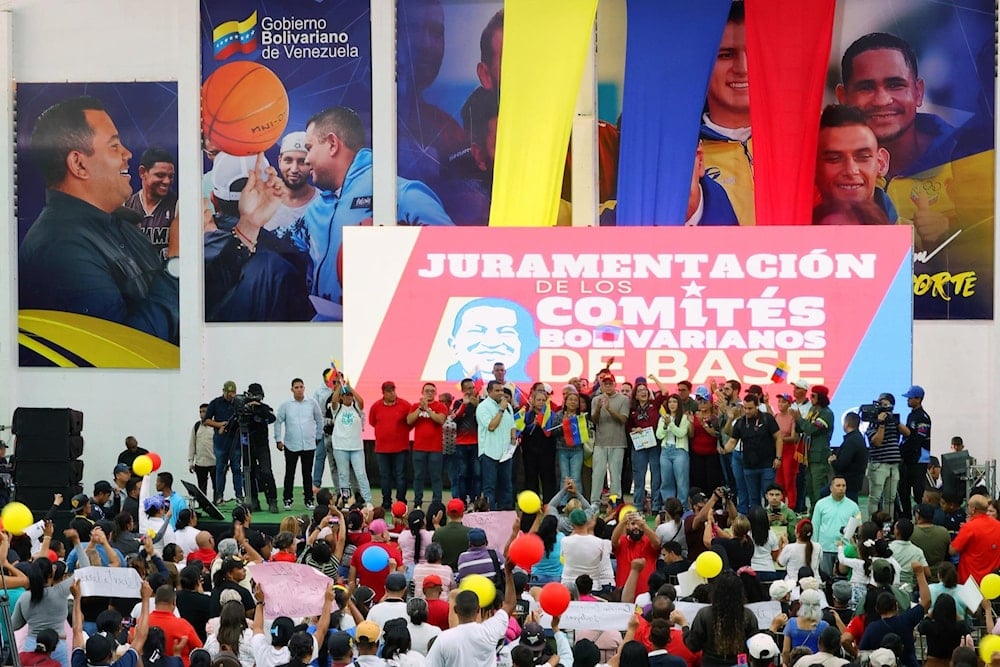Over 260,000 PSUV Integral Base Committees sworn in across Venezuela
Venezuela swore in over 260,000 PSUV Integral Base Committees, mobilizing six million citizens in a show of grassroots strength amid rising US pressure and threats to national sovereignty.
-

Swearing in of the Bolivarian Integral Base Committees (CBBI) of the United Socialist Party of Venezuela on November 15, 2025. (X/@PartidoPSUV)
Venezuela witnessed a massive political mobilization as more than 260,000 Integral Base Committees of the United Socialist Party of Venezuela (PSUV) were sworn in nationwide. These committees, comprising approximately six million citizens, mark a significant step in the PSUV’s organizational restructuring aimed at strengthening Popular Power and defending national sovereignty.
According to official figures, a total of 145,465 assemblies were held across the country, with an average of 20 citizens participating in each, in what authorities described as an unprecedented grassroots mobilization.
Executive Vice President Delcy Rodríguez, speaking from Puerto Cabello in Carabobo state, highlighted the effort as a tangible expression of the Bolivarian and nationalist project. She emphasized the need for the PSUV to evolve into a more resilient and democratic political structure.
“Today the contradiction is between Venezuela and the anti-Venezuela,” Rodríguez told thousands of party members and community leaders. “This party must be the expression of Venezuela… a free, moral, and independent Republic.” She underscored the role of the organizational re-engineering being led by the PSUV, aimed at consolidating collective leadership, expanding territorial consultation, and rejecting top-down governance models.
Rodríguez also pointed to the PSUV's role in resisting coup attempts and economic aggression, accusing the US-led powers of seeking to impose broader conflicts through military and financial means. She contrasted this with countries like China, which, she said, promote peace and development.
Cabello: Venezuela faces imperial threats with unity
From La Guaira, senior PSUV leader and Minister Diosdado Cabello reaffirmed the party's commitment to defending the homeland and working alongside the people in the face of US imperialist threats.
“The Homeland is completely besieged... Bullets and bombs do not distinguish between Chavistas and others,” he warned, adding that national unity is key to confronting foreign interference.
Cabello described the popular assemblies as vital in reinforcing the foundations of the Bolivarian process and as proof of the people’s readiness to protect Venezuela’s sovereignty and social transformation efforts.
In Miranda state, National Assembly President Jorge Rodríguez emphasized that the mobilization reflects the realization of late President Hugo Chávez’s vision of grassroots power.
Speaking during a meeting with the PSUV leadership and youth wing (JPSUV), Rodríguez noted that the organized People’s Power has been instrumental in the Bolivarian Revolution’s electoral, social, and economic victories. “We are thus fulfilling the dream of the eternal Commander in the advancement of the process,” he said.
The mass swearing-in of the Integral Base Committees comes as part of a broader effort to deepen citizen participation and reinforce the PSUV’s role as a central political force amid ongoing national and international challenges.
US-Venezuela escalating tensions
The massive mobilization comes amid escalating tensions between Washington and Caracas. Venezuelan officials have sent formal messages to the United Nations stressing that it is the United States that is militarizing the Caribbean basin, deploying warships, special forces, and surveillance assets under pretexts such as counter‑narcotics, while in reality pursuing regime change and control over Venezuela’s strategic resources.
These concerns are reinforced by reports detailing US operations like “Operation Southern Spear” and other buildup patterns that Caracas views as mechanisms to pressure the Venezuelan state, threaten its sovereignty, and normalize the idea of military options against President Nicolás Maduro’s government.
At the same time, Venezuelan leaders such as Maduro, Defense Minister Vladimir Padrino López, and parliamentary figures warn that US strikes on alleged drug boats and other incidents amount to unlawful killings and blockades, pointing to civilian casualties and lack of legal justification as evidence that these maneuvers are not genuine law‑enforcement actions but components of a broader coercive strategy.
In response, Caracas has moved to a posture of active deterrence and national mobilization, declaring states of emergency, announcing nationwide defense exercises, and deploying tens of thousands of troops alongside police and organized civilian structures across hundreds of locations.

 4 Min Read
4 Min Read










